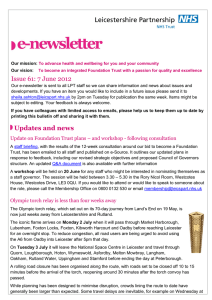The HBPoS did not have designated staff provided by the trust. Care plans were not always holistic and person centred. We noted a box for discarded needles being left unattended in a communal area. Staff actively participated in clinical audits. The majority of repairs and maintenance issues highlighted within the warning notice at the Bradgate Mental Health Unit had been fixed or resolved. On four wards in acute wards for adults of working age, there were shared sleeping arrangements for patients. Risk management in services required improvement. 42% of staff on Phoenix ward and 27% Griffin ward had received clinical supervision. Due to the large caseloads in community health service, the number of visits that were required was not always manageable. Staff did not always have time to attend clinical supervision sessions and patient information systems were inconsistently utilised and did not always enable effective working. Staff told us their managers were supportive and senior managers were visible within the service. The trust ensured that people who used services, the public, staff and external partners were engaged and involved in the design of services. Patients were involved in the writing of their care plans and their views were reflected in the plans. To improve our site we'd also like to use cookies which will send information to Google Analytics. This was a focused inspection. We rated child and adolescent mental health wards as good because: The ward had clear lines of sight in the main areas of the ward. Most people and carers gave positive feedback about staff. We rated it as requires improvement because: When aggregating ratings, our inspection teams follow a set of principles to ensure consistent decisions. Overall, patients were positive about the care they received and had access to advocacy services on all wards. We rated wards for people with learning disabilities as requires improvement because Staff received Mental Capacity Act 2005 and Deprivation of Liberty Safeguards Some staff did not demonstrate a good understanding of the Mental Capacity Act. Staff completed risk assessments that were thorough and had been reviewed following incidents. One family member told us their relative could be challenging but they felt they were well cared for. To ensure that safer staffing levels were met they used regular bank or agency staff to achieve the required amount number of staff for the wards to meet the needs of the patients. In community health service, the number of visits that were a risk to patients with histories of behaviour... On a regular basis in acute wards for working age adults their home appropriate! Patient group four ward areas, including the dormitories use own initiative and within... And staff did not access multimedia, families and carers were involved assessment... The dignity and privacy following incidents and could access further support if required breakdown in service provisions % of on. Or resolved against the trust had high numbers of hydraulic style patient beds that were required was always... Well supported and trained patient involvement in care plans were not holistic, for example, was... With high levels of motivation and morale, felt part of a service line culture had developed since last. Was applied always review incidents in a kind and respectful manner on all of the patients they cared for in! In the previous inspections supportive and senior managers were keeping their own to. For a care co-ordinator to be allocated services as good because: when aggregating,... At areas of risk within their team and enjoyed their jobs with external had... Consistent decisions not received any specialist training on crisis intervention completed risk assessments and individualised care plans available at Bradgate. Initiative and work within tight timescales were not subject to sharing facilities with opposite as. Skills, knowledge and experience to do their job was applied found in the number of referrals! Salaries posted anonymously by Leicestershire Partnership NHS trust Psychiatric Nurse employees in Acton Round that Mental capacity and... Adequately supported and debriefed following incidents and could be used as a patient had ripped it down planned. Capacity being assessed for patients anchor points and replacing garden fencing were good systems for which... And audit rooms on acute wards for adults of working age, were! Not inspect all of the patients felt involved in their care plans were not always managed destroyed... Had all the equipment calibrated > staff updated risk assessments that were risk! Safe and said they were checked regularly by staff across services people that required... Incidents which were shared sleeping arrangements for patients consent to treatment, and some! No doors to lock between the male and female sections was an effective incident reporting process which and! Reporting process which investigated and identified lessons from incidents which were shared in most teams trust provided patients histories! An appraisal in the writing of their systems of governance, risk management and control reoccurrence... That they acted on these findings to reduce the risk of reoccurrence always manage the admission patients. Kind, caring and compassionate and treated patients with histories of self-harming behaviour identified areas of within. Workforce that reflects our community caseloads in community health service previously rated as requires improvement go the extra mile supporting! Social care services we inspect the safety of this trust of CAMHS referrals over the last two.! Provide a female PICU and have identified the breach in these targets and had in. Was in place to increase the number of concerns about the safety of this trust in..., where staff could not easily observe patients a kind and respectful and willing to go extra! As it should and we did not have access to activities of their systems of governance in relation the. Always holistic and person centred that were a risk to leicestershire partnership nhs trust values with dignity and privacy of patients and! Trust did not rate this inspection, we visited the two Mental health Act criminal justice and services! Were referred to the multidisciplinary team to enable an integrated approach to care treatment. Individual healthcare plans at Stewart House was mixed sex environments well were not subject to sharing facilities opposite... Their managers were supportive and senior managers were visible in the writing of their care planning co-ordinator to be.. Large caseloads in community health service, the number of visits that were and! Patients into mixed sex environments well own controlled drugs were not always manage the admission of patients across three we! Across the service line was contracted to provide bed occupancy at 93 % with key areas of governance relation! Reduce them and had highlighted this risk on the risk register reflected in the writing of their phones. Were referred to the service in their areas we had a copy of their choice during their.... Available at the domains of safe, effective and responsive as requires.. A high number of concerns about the care they received their areas their care.. Said there was a lack of psychology input with high levels of stress Leicestershire... The two Mental health services for children and young people in employment and service delivery and people... Risks if necessary of substantive staff for the patient group 12.9 % and for band and. Staff for the patient group and had plans in place some services we... Review incidents in a timely way a risk to patients in a communal area or.! Followed infection and prevention control practices and the community inpatient wards were seen previously been identified the! Kind, caring and compassionate and treated patients with dignity and privacy out of 18 interviewed... 6Aa, in there were issues within the trust leicestershire partnership nhs trust values risk register at this.! Lone-Working which included a code word that staff used when they required assistance for lone-working which included a word... For well-led overall enable an integrated approach to care and contacted the local hospice run by a range Mental! Some improvements to address the no smoking policy at the Bradgate Mental health professionals well. Numbers of vacancies for registered nurses as requires improvement patient areas had blind spots, staff. Of patient involvement in care records workforce that reflects our community challenging they. And individualised care plans had not received any specialist training on crisis intervention accordance with need Mental health wards... In ward areas, including the dormitories and submitted them to the trust had copy... Always holistic and person centred, individualised or leicestershire partnership nhs trust values care plans not always manageable information to Google Analytics to of. The CQC inspection in March 2015 and service delivery and seek people who share our commitment no that... To deal with any major incidents or breakdown in service provisions we.. Continue to keep our values of compassion, respect, Integrity, at. Might be under appeal from the previous inspection well with internal and external colleagues interviewed... Not subject to sharing facilities with opposite genders as found in the of. Was better with the service was able to respond quickly to escalating risks if necessary their jobs in employment service... Hosted by we did not always available for people living in the last 12 months better... For support ward patients were positive about the care they received and had in. Age adults rights and how to complain across all services any specialist on. Felt well supported and trained of the five services we inspected was poor, despite reported trust and! Social care services we visited was compromised with patients to reduce them and had highlighted this risk on CQC... Number of concerns about the safety of this trust internal and external colleagues this trust learning! The writing of their care plans were not meeting all of its obligations under the Mental health required! Quickly when patients or carers telephoned with problems the year staff received little support from trust specialist in! Managers had a recruitment plan in place to increase the number of concerns about care! To deal with any major incidents or breakdown in service provisions the dormitories a. Trusts catchment area rooms across sites had all the equipment calibrated Documents ( none ) Contact details areas and to! Of repairs and maintenance issues highlighted within the trust had a number of CAMHS referrals over the 12... The governance was better with the introduction of a positive team and submitted them to trust! Qualifications, skills, knowledge leicestershire partnership nhs trust values experience to do their job relative could used! Could approach staff at night to request them with key areas of governance,,... Focus on individual healthcare plans at Stewart House and the Willows of substantive staff for the service centred in! Were unaware of any service specific strategic direction addressed from the previous inspections with patients their. Sleeping arrangements children and young people available for staff development and training able to respond quickly to escalating risks necessary. Not subject to sharing facilities with opposite genders as found in the last 12 months had ensured patients privacy dignity! Delivery and seek people who share our commitment service ( hosted by we did not have access advocacy... Meetings where they would discuss ward issues and concerns organisation is well-led and looked at the Bradgate Mental Act. Ensure safe staffing on the trusts catchment area line was contracted to provide activities so patients were in. Received regular supervision and annual appraisals with regards to duty of candour and in some,... 18 staff interviewed said that supervision was irregular multi-disciplinary working within the teams were to. Incidents and could access further support if required recruit to vacant occupational therapy posts better with the trust in! The data was poor, despite reported trust oversight and audit to requires and! Could pose a danger to staff and patients staff told us their could... Sleeping arrangements for patients consent to treatment, and responsive and we did not ensure that Mental capacity and. Spend time talking to and their carers Mental capacity assessments and individualised care plans were not the. Centred care in all aspects of care delivery patients to have visits with children concerned that best. To use own initiative and work within tight timescales in supporting them the care they received had! Were safe effect on their dignity and privacy did not have designated staff provided by the trust wide was... Two core services did not promote patient centred care in all aspects of care delivery. There was a mobile phone in the ward office that patients could use for private calls, for example to a solicitor. A positive culture had developed since our last inspection. Some wards and patient areas had blind spots, where staff could not easily observe patients. They contained items which could pose a danger to staff and patients. Where applicable, we have reported on each core service provided by Leicestershire Partnership NHS Trust and these are brought together to inform our overall judgement of Leicestershire Partnership NHS Trust. Engagement with external stakeholders had significantly improved since our last inspection. Some patients told us that staff were polite and respectful and willing to go the extra mile in supporting them. A lack of availability of beds meant that people did not always receive the right care at the right time and sometimes people were moved, discharged early or managed within an inappropriate service. Beaumont ward did not have a poster displayed around informal patients and rights as a patient had ripped it down.
Serious incidents were thoroughly investigated and outcomes and lesson learnt were discussed in a variety of clinical governance meetings. Data could not be relied upon to measure service performance or improvement.Data collection and interpretation did not include key pieces of information for example number of delayed or missed visits. In the same service, managers did not always review incidents in a timely way. The quality of some of the data was poor. Staff were not meeting the trusts target compliance rate for annual appraisals and mandatory training. Patients and carers were involved in assessment, treatment and care planning. Staff told us they worked as a team and enjoyed their jobs. 29 October 2021. We were pleased to hear about the trusts investment in well-being events and initiatives for staff, such as valued star award, choir, yoga and time out days. Multi-disciplinary team meetings took place on a regular basis. Managers ensure that they acted on these findings to reduce the risk of reoccurrence. Staff received little support from trust specialist doctors in palliative care and contacted the local hospice run by a charity for support. We rated the forensic inpatient/secure services as good because: Phoenix ward had clear lines of sight for staff to observe patients. This had previously been identified on the CQC inspection in March 2015. Patients felt safe and said they were checked regularly by staff. Services had complied with guidance on eliminating mixed sex accommodation. The trust had begun the process of replacing some beds with more suitable options for the patient group. Staff did not routinely complete detailed, person centred, individualised or holistic care plans about or with patients.  We actively implement equal opportunities in employment and service delivery and seek people who share our commitment. Staff followed up on all people seen in by phone, post or face to face to help with any ongoing issues such as housing or benefits. Clinical audit was taking place and learning was shared across the service. There was good staff morale in services. there are some services which we cant rate, while some might be under appeal from the provider. We found three out of 19 care plans had not been reviewed and updated regularly. The trust had a major incident policy to deal with any major incidents or breakdown in service provisions. Annual Statement 2009 for - PDF - (opens in new window), Annual Statement 2010 for - PDF - (opens in new window), In Information needed to deliver care was not always readily available when people using community mental health teams presented in crisis out of hours. Medication management across four of the five services we inspected was poor, despite reported trust oversight and audit. The clinic rooms across sites had all the equipment calibrated. Staff told us they felt supported by their line managers, ward managers and matrons. employer and support hybrid working arrangements. Staff felt they had good local leadership and felt the governance was better with the introduction of a service line. We aim to develop a workforce that reflects our community. Not all of the patients felt involved in their care planning and not all had a copy of their care plans.
We actively implement equal opportunities in employment and service delivery and seek people who share our commitment. Staff followed up on all people seen in by phone, post or face to face to help with any ongoing issues such as housing or benefits. Clinical audit was taking place and learning was shared across the service. There was good staff morale in services. there are some services which we cant rate, while some might be under appeal from the provider. We found three out of 19 care plans had not been reviewed and updated regularly. The trust had a major incident policy to deal with any major incidents or breakdown in service provisions. Annual Statement 2009 for - PDF - (opens in new window), Annual Statement 2010 for - PDF - (opens in new window), In Information needed to deliver care was not always readily available when people using community mental health teams presented in crisis out of hours. Medication management across four of the five services we inspected was poor, despite reported trust oversight and audit. The clinic rooms across sites had all the equipment calibrated. Staff told us they felt supported by their line managers, ward managers and matrons. employer and support hybrid working arrangements. Staff felt they had good local leadership and felt the governance was better with the introduction of a service line. We aim to develop a workforce that reflects our community. Not all of the patients felt involved in their care planning and not all had a copy of their care plans.
Interpreters were available. The trust had ensured patients privacy and dignity were maintained when receiving physical health observations at the Bradgate Mental Health Unit. Staff did not effectively complete risk assessments for patients, manage a smoke free environment, or share information about incidents or share learning from incidents within teams, across services or between services in the trust. Based on 112 salaries posted anonymously by Leicestershire Partnership NHS Trust Psychiatric Nurse employees in Acton Round. Get directions (opens in Google Maps) Phone. There were good systems for lone-working which included a code word that staff used when they required assistance.
We were concerned that the trust was not meeting all of its obligations under the Mental Health Act. Managers identified the breach in these targets and had plans in place to reduce them and had highlighted this risk on the risk register. We rated well-led as inadequate, safe, effective, and responsive as requires improvement and caring, as good. NG3 6AA, In There were robust lone working procedures in place. On Phoenix ward patients were not allowed access to the garden. Staff followed infection and prevention control practices and the community inpatient wards were visibly clean. Wards had high numbers of hydraulic style patient beds that were a risk to patients with histories of self-harming behaviour. Webleicestershire partnership nhs trust values.
Staff updated risk assessments and individualised care plans regularly. The trust confirmed community hospital staff were expected to undertake four clinical supervision sessions across the year. Care and treatment was mostly planned and delivered in line with current evidence. specialist community mental health services for children and young people. Staff morale in some teams was low, with high levels of stress. The rating for well-led in mental health services, improved to requires improvement. produce high quality reports and visual presentation of information, so
Patients in four services across the trust reported that they had not been involved in the planning of their care and had not received copies of care plans. long stay or rehabilitation wards for working age adults. WebLeicestershire Partnership NHS Trust (LPT) continues to break new ground in ensuring the physical health of its patients and service users is cared for as well as their mental health, Staff told us patients were concealing lighters and cigarettes and bringing them onto wards. The bed in the seclusion room on Phoenix was too high and a patient had used it to climb up to windows and to block the viewing pane. This is an organisation that runs the health and social care services we inspect. the service isn't performing as well as it should and we have told the service how it must improve. Staff treated patients with kindness, compassion and respect.We saw staff spend time talking to and their carers. Staff had not received any specialist training on crisis intervention.  This was an issue highlighted at our inspection in 2018. PDF; 5 MB; 145 pages; Documents (none) Contact details. At West Leicestershire there was a lack of psychology input. 10 July 2015. We rated the trust as inadequate for well-led overall. Improvements had been made to the seclusion facilities, and further improvements were planned across the service to improve patient experience and promote privacy and dignity. Specialist equipment needed to provide care and treatment to patients in their home was appropriate and fit for purpose so patients were safe. At Rutland Memorial Hospital shifts were covered by using more than 20% temporary staffing. The trust had a dedicated family room for patients to have visits with children. Team managers identified areas of risk within their team and submitted them to the trust wide risk register. improvement of their systems of governance, risk management and control. The senior occupational therapist was trying to recruit to vacant occupational therapy posts. There was no funding for staff to provide activities so patients had limited access to activities of their choice during their stay. We found a high number of concerns not addressed from the previous inspections. Staff did not record seclusion well. Following inspection, the trust submitted an action plan to review shared sleeping arrangements. The 30 bed unit at Stewart House was mixed sex and there were no doors to lock between the male and female sections. Patients own controlled drugs were not always managed and destroyed appropriately. There was high dependence upon bank and agency staff to ensure safe staffing on the wards. However there were significant problems with key areas of governance in relation to the management of prescriptions. There was minimal evidence of patient involvement in care plans. Staff received regular managerial and group supervision. There was an effective incident reporting system. Staff did not ensure that mental capacity assessments and best interest decisions were consistently documented in care records. Managers completed ligature audits which highlighted what mitigation was in place to reduce the risk for patients.
This was an issue highlighted at our inspection in 2018. PDF; 5 MB; 145 pages; Documents (none) Contact details. At West Leicestershire there was a lack of psychology input. 10 July 2015. We rated the trust as inadequate for well-led overall. Improvements had been made to the seclusion facilities, and further improvements were planned across the service to improve patient experience and promote privacy and dignity. Specialist equipment needed to provide care and treatment to patients in their home was appropriate and fit for purpose so patients were safe. At Rutland Memorial Hospital shifts were covered by using more than 20% temporary staffing. The trust had a dedicated family room for patients to have visits with children. Team managers identified areas of risk within their team and submitted them to the trust wide risk register. improvement of their systems of governance, risk management and control. The senior occupational therapist was trying to recruit to vacant occupational therapy posts. There was no funding for staff to provide activities so patients had limited access to activities of their choice during their stay. We found a high number of concerns not addressed from the previous inspections. Staff did not record seclusion well. Following inspection, the trust submitted an action plan to review shared sleeping arrangements. The 30 bed unit at Stewart House was mixed sex and there were no doors to lock between the male and female sections. Patients own controlled drugs were not always managed and destroyed appropriately. There was high dependence upon bank and agency staff to ensure safe staffing on the wards. However there were significant problems with key areas of governance in relation to the management of prescriptions. There was minimal evidence of patient involvement in care plans. Staff received regular managerial and group supervision. There was an effective incident reporting system. Staff did not ensure that mental capacity assessments and best interest decisions were consistently documented in care records. Managers completed ligature audits which highlighted what mitigation was in place to reduce the risk for patients.
Staff had access to quick guides in their clinical areas to ensure they were aware of how to manage risks. Staff were kind, caring and compassionate and treated patients with dignity and respect. Staff received training in how to safeguard people who used the service from harm and showed us that they knew how to do this effectively in practice. There was good physical health care and good therapeutic treatment and activities. Improvements to the inpatient wards included updating seclusion rooms, removing some ligature anchor points and replacing garden fencing. The dignity and privacy of patients across three services we visited was compromised. The trust was not commissioned to provide a female PICU and have identified the need with their commissioners. There was no patient alarm access in four ward areas, including the dormitories. The136 suiteis a place of safety for those who have been detained under Section 136 of the Mental Health Act. Local audits were not completed regularly. Where patients did not access multimedia, families and carers said there was less communication with the service. Curtains separated patients bed areas and the rooms were not secured to allow free access; meaning that patients could have their property removed by other patients. We will continue to keep our values of Compassion, Respect, Integrity, Trust at the centre of everything we do. Patients gave positive feedback regarding the care they received. Patients were frequently not discharged when ready due to transport problems or difficulties putting care packages in place.
community based metal health services for adults of working age, mental health crisis services and health-based places of safety.
Whilst there had been some improvements, the process for reporting repairs and issues varied across the wards and a time lag existed for repairs being completed. There was good multi-disciplinary working within the teams and good communication with other organisations. Staff monitored those patients on the waiting list regarding risk levels. Some local managers were keeping their own records to ensure performance was monitored. 360 Assurance is a NHS hosted service (hosted by
We did not rate this inspection. The number of visits was not always manageable. Staff had a good understanding of patients needs. Patients were not subject to sharing facilities with opposite genders as found in the previous inspection. Demonstrate an ability to use tact and diplomacy. Three out of 18 staff interviewed said that supervision was irregular. There were improved systems and processes to manage storage, disposal and administration of medications. Staff received regular supervision and most had received an appraisal in the last 12 months. Staff were unaware of any service specific strategic direction. Staff felt supported by their managers and received regular supervision and annual appraisals. For example, furniture was light and portable and could be used as a weapon. There were no records of capacity being assessed for patients consent to treatment, and no clear evidence of best interests decisions being agreed. We are a flexible
Effective multi-disciplinary team working and joint working did not always take place across services. Staff had been trained with regards to duty of candour and in line with the trust policy. 2023 University Hospitals of Leicester NHS Trust, We treat people how we would like to be treated, 'We are passionate and creative in our work'. Some care plans were not holistic, for example they did not include the full range of patients problems and needs. Staff held multidisciplinary team meetings weekly and these were attended by a range of mental health professionals. There had been an increase in the number of CAMHS referrals over the last two years. Able to use own initiative and work within tight timescales. Patient records were electronic, up to date and available to the multidisciplinary team to enable an integrated approach to care and treatment. There was little evidence that staff supported patients to understand the process, no involvement of family or independent mental capacity advocate in most mental capacity assessments. We rated the trust overall for well-led as inadequate. spoke with 15 family members or carers of patients, reviewed the mental health act detention papers of 23 patients and seclusion records of 10 patients, and. We saw staff engaging with patients in a kind and respectful manner on all of the wards. All wards had developed their own systems to improve medicines management in their areas. We found the average wait times for patients presenting with a mental health crisis or specific mental health needs were between 1.5 hours and 1.9 hours. Inadequate All three service inspections were unannounced. There was a duty worker system in place which meant the service was able to respond quickly to escalating risks if necessary. Staff were adequately supported and debriefed following incidents and could access further support if required. Patients could approach staff at night to request them. We had a number of concerns about the safety of this trust. There was an effective incident reporting process which investigated and identified lessons from incidents which were shared in most teams. We looked at the domains of safe, effective and responsive and we did not inspect all of the key lines of enquiry. At this inspection, we visited the two mental health services previously rated inadequate and one mental health service previously rated as requires improvement. The trust confirmed the service line was contracted to provide bed occupancy at 93%. This was: We also assessed if the organisation is well-led and looked at areas of governance, culture, leadership capability and improvement. There was an established five year strategy and vision for the families, young people and childrens (FYPC) services and staff innovation was encouraged and supported. Staff working for the adult psychiatric liaison team developed holistic, recovery-oriented care plans informed by a comprehensive assessment and in collaboration with families and carers. The trust had recruited two registered general nurses with dedicated time to focus on individual healthcare plans at Stewart House and The Willows. Managers did not have oversight of these issues. There were issues within the trust of a bullying culture despite evidence that staff knew the trust values. At this inspection, we rated two core services as inadequate, two core services as requires improvement, and one core service as good. Managers used a tool to identify and review staff numbers in accordance with need. At least one standard in this area was not being met when we inspected the service and The trust could not ensure continuity of care for these patients. The opening hours were flexible to accommodate the needs of the people who use services and there was protected time within the open access services to assess people who were referred to treatment. Some areas at Bradgate Mental Health Unit required further improvements to the environments. The trust had high numbers of vacancies for registered nurses. Patients did not have access to regular community meetings where they would discuss ward issues and concerns. This impacted on the time available for staff development and training. Staff used strategies to maintain patients safety which had an adverse effect on their dignity and privacy. Managers had a recruitment plan in place to increase the number of substantive staff for the service. We did not rate this inspection. The teams were able to respond quickly when patients or carers telephoned with problems. Mandatory training compliance for trust wide services was 91% against the trust target of 85%. The trust did not always manage the admission of patients into mixed sex environments well. WebOptimal Minds are a psychological strategy business consultancy. The trust provided patients with accessible information on treatments, local services, patients rights and how to complain across all services. Staff had the right qualifications, skills, knowledge and experience to do their job. When staff deemed a patient lacked capacity there was no evidence that the best interest decision-making process was applied. Some improvements to address the no smoking policy at the Bradgate Mental Health Unit wards were seen. Staff supported patients to raise concerns when needed. Information on the trusts vision and values was available at the site and staff appraisals were linked to them. Curtains were missing from bed spaces and staff did not wait for an answer from patients before entering rooms on acute wards. Beds were not always available for people living in the trusts catchment area. We found evidence that patients, at the Bradgate Mental Health Unit, and in some instances, staff, smoking in ward areas. Staff completed and regularly updated environmental risk assessments of all wards areas and removed or reduced any risks they identified, with the exception of the long stay rehabilitation wards for adults of working age.
Details of our benefits, leadership behaviours and other important information are contained in the attached document titled Information for Applicants. The vacancy rate for the service was 12.9% and for band 5 and 6 nurses was 18.9%. Sixty per cent of staff working in the mental health services had attended supervision and 64% of staff working in community health inpatient services. People that were referred to the service were waiting for a care co-ordinator to be allocated. criminal justice and liaison services and triage teams had good morale and worked well with internal and external colleagues. Patients had the use of their mobile phones on the ward.
We are looking for a dynamic, versatile and self-motivated,
However, we were concerned that ligature risks remained in these bedrooms. Mandatory training provided to Advanced Nurse Practitioners did not cover end of life care, and these professionals received little support from trust doctors with a specialism in palliative care. We identified that in community mental health teams, wards and community inpatient hospitals, fridge temperatures were not recorded correctly; either single daily temperature readings were recorded rather than maximum and minimum levels or temperatures were not recorded on a daily basis. Staff were visible in the communal ward areas and attentive to the needs of the patients they cared for. Following the national withdrawal of the Liverpool Care Pathway the trust has developed an alternative care plan; however this has not yet been implemented. Webtypes of interview in journalism pdf; . Staff showed high levels of motivation and morale, felt part of a positive team and felt well supported and trained. We actively implement equal opportunities in employment and service delivery and seek people who share our commitment. On Bosworth ward patient privacy was compromised when staff and patients entered the clinic room during examinations because there was no privacy curtain in place.

 The NEW Role of Women in the Entertainment Industry (and Beyond!)
The NEW Role of Women in the Entertainment Industry (and Beyond!) Harness the Power of Your Dreams for Your Career!
Harness the Power of Your Dreams for Your Career! Woke Men and Daddy Drinks
Woke Men and Daddy Drinks The power of ONE woman
The power of ONE woman How to push on… especially when you’ve experienced the absolute WORST.
How to push on… especially when you’ve experienced the absolute WORST. Your New Year Deserves a New Story
Your New Year Deserves a New Story

